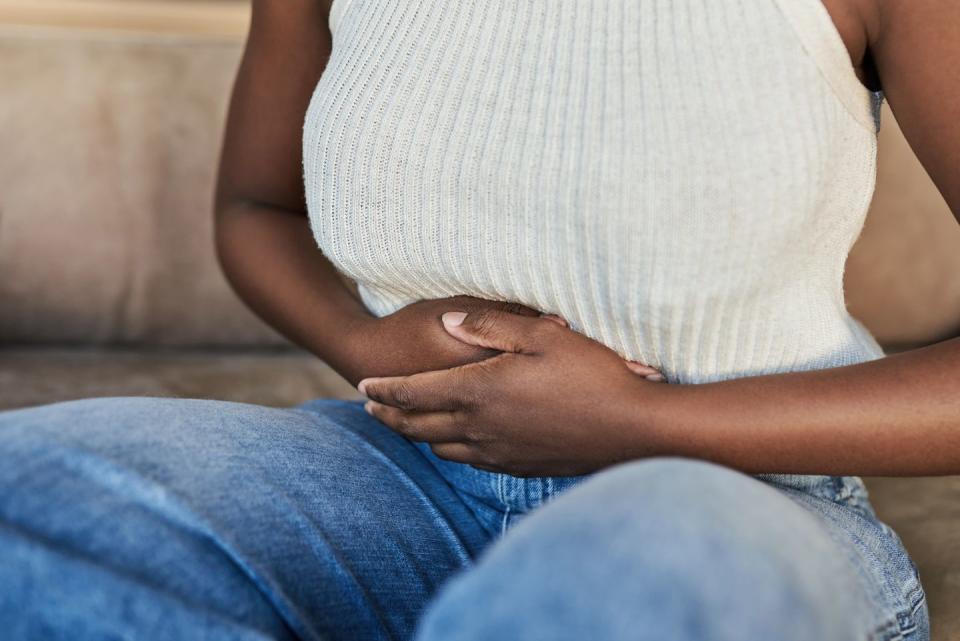Signs of hormonal imbalance and how to treat it

Did you know anyone can experience hormonal imbalances? In case you need a reminder, "hormones are chemicals in the body which help to regulate various bodily functions". In other words, they're responsible for some pretty important processes, including our metabolism, mood, sleep, and sexual function, Dr Sayyada Mawji tells Cosmopolitan.
As a GP, Dr Mawji knows how small changes in hormone levels can have a "significant effect" on the body, but she also's familiar with the many treatment options available to someone with a hormonal imbalance, which occurs "when there is too much or too little of a certain hormone."
So too does Dr Samantha Wild, Women’s Health Clinical Lead and GP at Bupa Health Clinics, who explains hormonal imbalances "tend to happen during different times in a woman’s life when their hormones naturally shift, this could include before or after their period, pregnancy or menopause", though it's worth noting imbalances can affect anyone, regardless of gender, at any age.
How then can we identify hormonal imbalances? What are the signs? How is it treated? And is there anything else you ought to know? The experts have answers...
What causes a hormonal imbalance?
"An imbalance of hormones can be caused by many factors such as lifestyle, medication, chemotherapy, tumours, Polycystic Ovary Syndrome (PCOS), thyroid problems and diabetes," explains Dr Wild.
As she says, women can be affected during different times in their lives, including before or after their period, pregnancy or menopause. Dr Wild adds that men may also experience a hormonal imbalance for various reasons, such as after picking up an injury or due to ageing.
What are the signs of hormonal imbalance?

According to Dr Mawji and Dr Wild, signs include:
Heavy, irregular, or painful periods
Anxiety and panic attacks
Depressed and feeling low
Paranoid or negative feelings
Loss of confidence
Reduced memory / concentration / attention
Brain fog
Palpitations
Weight changes
Diarrhoea or constipation
Aching joints
Poor sleep
Exhaustion
Excessive sweating
Hot flushes and night sweats
Vaginal dryness
Mood swings / short fuse
Acne
Change in libido
Hair loss
Acne
"Many of these symptoms can also be caused by other conditions that may not be due to hormonal imbalance," Dr Mawji points out. "Therefore, it is important to see your doctor if you experience any symptoms."
How is a hormonal imbalance diagnosed?
"Hormonal imbalance is usually diagnosed through having a blood test which checks the levels of the hormone in your blood. The blood test results alongside a thorough history and physical examination will help to determine the cause of the hormonal imbalance," explains Dr Mawji.
Can you prevent a hormonal imbalance?

As we've already touched upon, there are various causes when it comes to hormonal imbalances. Certain lifestyle choices such as diet and exercise habits may also come into play, explains Dr Mawji. As such, "You may not be able to totally prevent hormonal imbalances but taking steps to improve your lifestyle such as reducing your stress levels, getting enough sleep, healthy diet and exercising can all help to reduce the risk factors."
Dr Wild adds that quitting smoking, and losing weight if you're overweight or obese, can also help to reduce your risk and boost your overall health.
How is a hormonal imbalance treated?
There are various treatments that can help with a hormone imbalance, explains Dr Wild. These include going on the contraceptive pill, taking HRT if you’re menopausal or medication to treat thyroid disease.
The expert adds that there are lifestyle changes you may also you can wish to consider.
Exercise regularly – "This will not only help you to lose weight but may help regulate your menstrual cycle. Make sure you are trying out different things that you enjoy so you’ll be encouraged to stick to it."
Eat well – "Make sure you’re eating a balanced. Reduced processed fats from your diet and get lots of fruit and vegetables."
Decrease vaginal discomfort – "Vaginal dryness can be a real problem if you have a hormone imbalance. Make sure you use lubes or moisturisers to ease discomfort."
Avoid hot flush triggers - "Try to identify things that commonly trigger your hot flushes, such as warm temperatures, spicy foods, or alcohol."
But, of course, your GP should be your first port of call. "Your medical team will guide your treatment," adds Dr Mawji.
This article is not intended to be a substitute for professional medical advice or diagnosis. Always seek the advice of your physician or other qualified health provider with any questions you may have regarding a medical condition.
You Might Also Like


